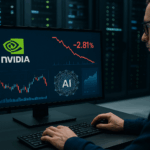On Tuesday, U.S. stocks experienced a notable retreat, driven by rising concerns over a potential AI bubble and ongoing uncertainties surrounding the broader U.S. economy. This market apprehension comes just ahead of a crucial earnings report from chipmaker Nvidia (NVDA) and delayed jobs data, which are expected to provide vital insights into economic trends.
The Dow Jones Industrial Average (^DJI) fell nearly 0.8%, marking its worst three-day performance since April. Meanwhile, the tech-heavy Nasdaq Composite (^IXIC) retracted approximately 0.5%, and the S&P 500 (^GSPC) was down around 0.3%, signaling its fourth consecutive session of losses.
Additionally, a significant dip was observed in the cryptocurrency market, with Bitcoin dropping below $90,000 for the first time in seven months. This decline contributed to heightened alarm in Asia, where Japanese stocks recorded their worst loss since April, while concurrently pushing 10-year Treasury yields (^TNX) lower.
Investors are increasingly wary of the *AI bubble*, amidst signs that the market may be straining under its weight. All eyes are now fixed on two critical upcoming tests: Nvidia’s impending third-quarter results and the September jobs report, which will shape expectations for the Federal Reserve’s future policy moves.
Nvidia Earnings Report and Economic Outlook
Nvidia’s third-quarter earnings report is scheduled for release on Wednesday. Given the recent surge in Big Tech debt issuance, analysts are questioning the sustainability of this year’s AI-driven market rally. The company has been a major player in the AI landscape, and its performance could either reaffirm or challenge investors’ confidence in the tech sector’s growth trajectory.
Looking beyond Nvidia, the upcoming jobs report, delayed due to the U.S. government shutdown, is anticipated on Thursday. This report is particularly significant as it is the first major economic reading since the shutdown, and traders are adjusting their expectations for potential interest rate cuts. A month ago, there was total conviction in rate cuts, but that sentiment has shifted, with current probabilities sitting at a 46% chance of easing.
Recent data from ADP on Tuesday indicated that job losses in the private sector are slowing as the economy heads into November. Investors are closely monitoring these trends, particularly as several retailers are about to report earnings, which will provide additional context regarding consumer strength as the holiday season approaches. Notably, Home Depot (HD) has adjusted its full-year profit guidance downward after missing earnings estimates, resulting in a nearly 4% drop in its stock price.
Market Implications and Consumer Sentiment
The mixed signals from both the tech sector and consumer-based companies like Home Depot reflect broader economic trends. Major retail chains such as Walmart (WMT) and Target (TGT) are also set to release earnings this week, which will likely shed light on consumer spending patterns.
The fluctuation in the stock market and the tech sector’s vulnerability introduce significant uncertainty for investors. With concerns about the sustainability of growth fueled by AI and the subdued performance of cryptocurrencies, market participants are left grappling with how these factors will ultimately affect their investment strategies.
As the market braces for Nvidia’s earnings and the critical jobs data, the implications of the AI narrative remain pivotal. Whether the sector can weather the current volatility could set the tone for future investments and technological advancements. With AI becoming more integrated into business models, the stakes have never been higher for both investors and consumers alike.
See also Peec AI Raises $21M Series A to Expand AI Search Marketing Platform and Hire 40+ Staff
Peec AI Raises $21M Series A to Expand AI Search Marketing Platform and Hire 40+ Staff Alphabet’s Sundar Pichai Warns AI Investment Boom Shows Signs of Irrationality
Alphabet’s Sundar Pichai Warns AI Investment Boom Shows Signs of Irrationality Nvidia’s Earnings Report Set to Impact AI Market Stability Amid 2.81% Stock Decline
Nvidia’s Earnings Report Set to Impact AI Market Stability Amid 2.81% Stock Decline AppsFlyer Launches Eight New Products in Next-Gen Marketing Cloud for Data and AI Growth
AppsFlyer Launches Eight New Products in Next-Gen Marketing Cloud for Data and AI Growth Top Investors Sell Nvidia Shares Amid $5.8B SoftBank Exit and AI Market Concerns
Top Investors Sell Nvidia Shares Amid $5.8B SoftBank Exit and AI Market Concerns









































































